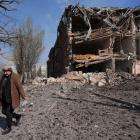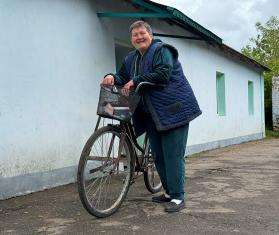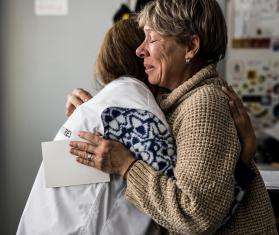In 2023, we used specially designed medical trains to evacuate thousands of patients from frontline areas to safer places where they could receive the specialized care they needed. At the end of the year, this service wound down due to a shift in needs, while our ambulance service scaled up to focus on emergency care. Of the many thousands of patients we referred, almost 60 percent were treated for violent trauma.
Our teams supported the emergency department and surgical and intensive care units at Kostiantynivka and Selydove hospitals in Donetsk region until the end of 2023, when the frequency and proximity of shelling became too dangerous to safely maintain a continuous staff presence. However, we established and managed to maintain a constant presence in a hospital in Kherson city, supporting trauma and surgical care.
Mental health support remained a crucial component of our response. In September, we started providing specialized psychotherapeutic services for people experiencing PTSD symptoms at a new center in the Vinnytsia region. In a shelter run by local organizations in Zernove, Kharkiv region, we offered psychological care to people who had moved from Russia and Russian-occupied regions of Ukraine.
MSF also ran early rehabilitation projects for war-wounded people in Cherkasy, Zhytomyr, Kyiv, Sumy, and Vinnytsia regions, implementing a multidisciplinary approach comprising physiotherapy, psychological support, and nursing care.
We continued to run mobile clinics delivering a range of services, including basic health care, emergency surgery, and treatment for chronic conditions in Kharkiv, Dnipro, Mykolaiv, Kherson, and Donetsk regions, where many of our patients were elderly people. Throughout the year, we donated medicines and medical supplies to dozens of health facilities and conducted training for health professionals and first responders.









